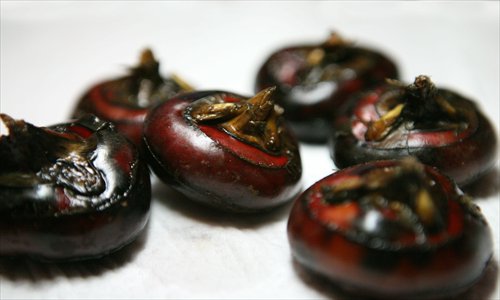Here comes the rain again
Editor's note:
The ancient Chinese created an agricultural solar system - still in use today - that is based upon their observation of crops, climate, astrology, and the study of animal and plant life cycles. The system guided farmers as to when to sow seeds and when to harvest them, and this system has now been in place for more than 2,000 years.
Today, with advances in science and technology, agriculture depends less on this ancient wisdom. But this seasonal calendar still operates as a reference guide for gourmands to seek out the best times for seasonal delicacies and for health experts to plan nutritious diets.
In a single year, the system features 24 "solar terms," each lasting one day and occurring every two weeks. Each has its own name and characteristics. The Global Times is presenting a weekly series examining which foods and delicacies are best enjoyed during these periods, as well as tips on preserving general health.
Hao yu zhi shijie, dang chun nai fa sheng is a line by the famous poet Du Fu who lived during the Tang Dynasty (618-907) and reveals his happy feelings at seeing the spring rains falling and nourishing the plants.
And as yushui or "the rains," fell this Monday, the city has been suitably permeated in a wet drizzle of showers.
Snow no more
Yushui normally foretells of an increase in wet weather during this 15-day term, while also indicating a warming up of temperatures as rains gradually replace snow across much of the country.
As one of the few people in China that still marks yushui, some citizens in Sichuan Province use the occasion to find godfathers for their children on the first day of the solar term. This is seen as an auspicious act that will guarantee health and good fortune for their offspring.
Meanwhile, the custom of married women visiting their parents' home during this solar period is still popular in rural areas of western Sichuan. On the first day of yushui, these women will bring presents of either a special-recipe pork or, curiously enough, a pair of chairs to their parents to express their filial gratitude.
There is a popular saying in China, zhengyue cong, eryue jiu, which means the spring onions harvested in the first lunar month are the best tasting of the year, and Chinese chives harvested in the second lunar month are another delicacy.
Spring onions are slightly "warm" in nature according to traditional Chinese medicine (TCM), and are reputed to relieve headaches and stuffy noses caused by colds. They are also said to alleviate bellyaches and diarrhea.

Naturally harvested
"Most locally grown vegetables available in markets during yushui are produced in greenhouses because the temperature is still very low. However, some vegetables harvested naturally in winter are big favorites to be served during yushui," said Jiang Chuanjun, an experienced chef at the Zuishanghai Restaurant (2/F, 261 Yunnan Road South, 6311-1659).
Water chestnuts, known as "underground pears" or "ginseng grown in southern China," are harvested in winter and early spring, and are also a popular recommendation of TCM doctors.
"Cold" in nature, water chestnuts help to alleviate fever and coughs as well as excessive phlegm caused by abscesses in the lungs, according to TCM. It is also rich in phosphorus, which functions to promote the growth of bones and teeth, and to stabilize the body's acid-alkaline balance.
Chinese yam is also a top food option for early spring. This vegetable is known for its multiple applications in nourishing the kidneys and lungs, as well as promoting digestion.

The Global Times has found two DIY recipes which are ideal for enjoying these nutritional delicacies in your own home.
Rice porridge with water chestnuts and angelica
Ingredients:
100 grams rice, 30 grams water chestnuts, 15 grams Chinese angelicas, 2 tsp honey
Method:
Slice the Chinese angelicas, and dice the water chestnuts
Boil the Chinese angelicas and simmer for 30 minutes, remove them and then add the rice to the same water and boil and simmer for five minutes
Add the water chestnuts to the porridge, boil for another three minutes and serve with honey
Sweet soup with Chinese yam
Ingredients:
150 grams Chinese yam, 100 grams white fungi, 50 grams lotus seeds, 50 grams rock candy, 10 grams Chinese wolfberries
Method:
Steep the white fungi in warm water for 15 minutes and tear into small pieces
Steep the lotus seeds in warm water for 30 minutes and throw away the nut inside
Peel the Chinese yam and slice into 2-centimeter long pieces
Heat 1.5 liters water, add all the prepared ingredients, boil and simmer for 30 minutes, and serve